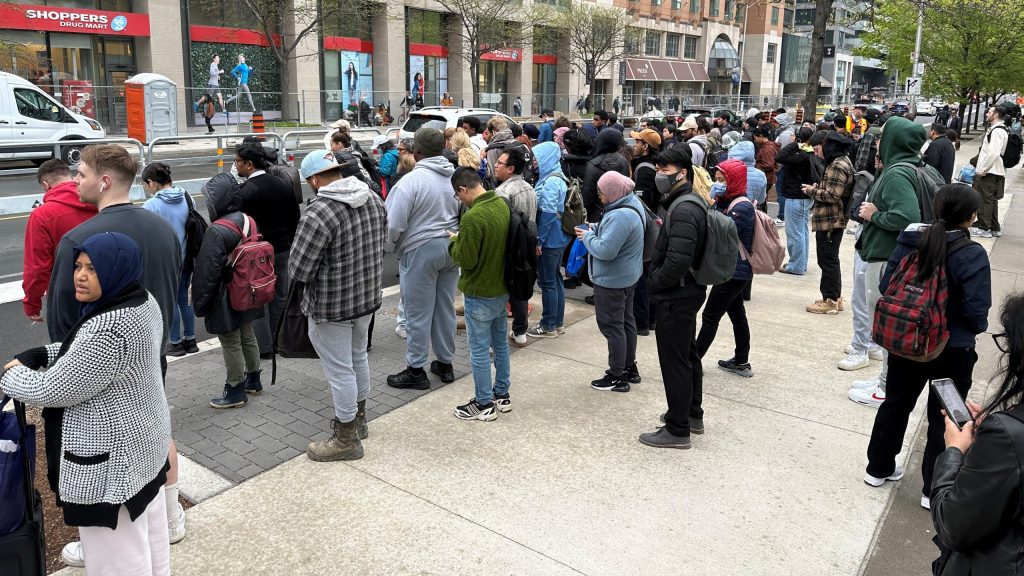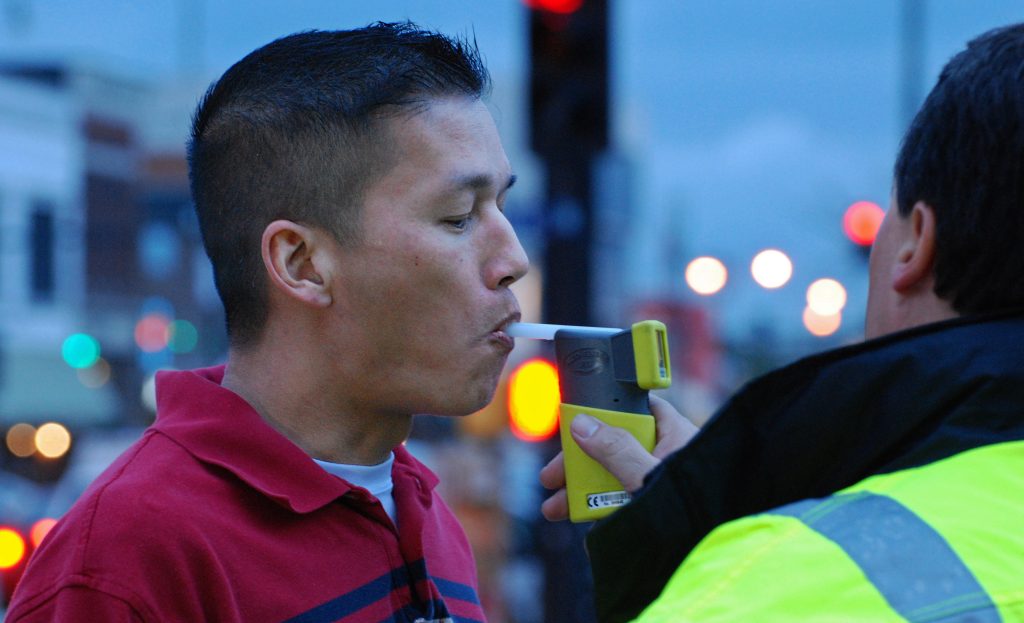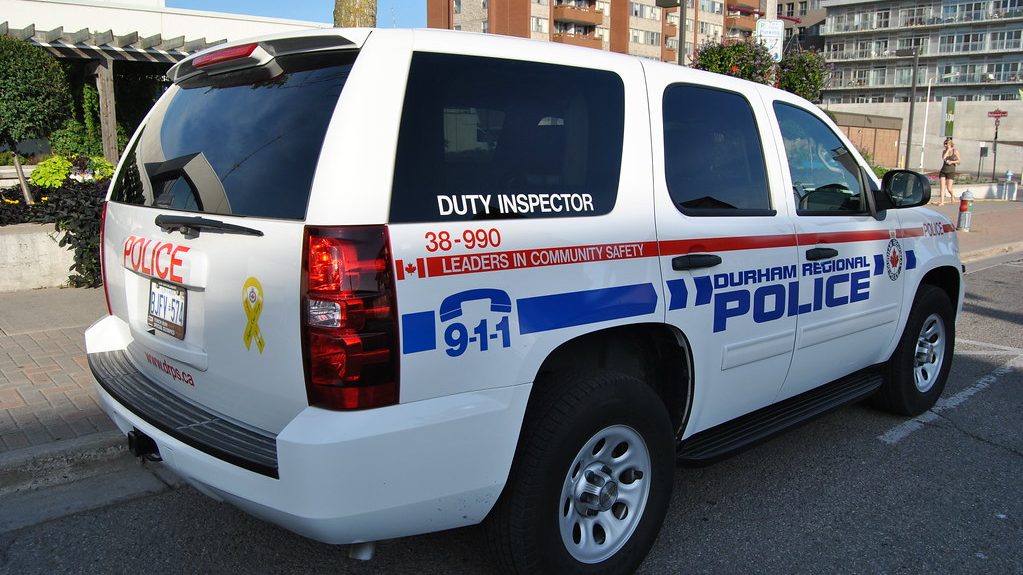Metrolinx report on public transit funding tools backs gas tax, HST hike
Posted May 27, 2013 6:44 pm.
This article is more than 5 years old.
TORONTO – A business off-street parking levy, a fuel tax and increased HST are among transit-expansion revenue tools recommended by Metrolinx.
The average household in the Greater Toronto and Hamilton area may end up paying $477 more a year in taxes to expand public transit.
Metrolinx president Bruce McCuaig stands by the recommendations.
“Families are already shelling out over $1,600 a year in terms of the cost of congestion they’re facing each and every year,” he said.
The list of recommendations include:
- A one per cent increase to the Harmonized Sales Tax, estimated to generate $1.3-billion annually
- A five cents per litre regional fuel and gasoline tax, estimated to generate $330-million annually
- A business parking levy on all off-street non-residential parking spaces, estimated to generate $350-million annually
- Development charge amendments, estimated to generate $100-million annually
Most of the $2 billion a year needed to fund transit will fall to taxpayers under the Metrolinx plan.
It’s a lot of money, but everyone will benefit from less congestion, said chairman Robert Prichard.
“We’ve very aware that $477 for a family is a substantial amount of money, this isn’t a suggestion that it’s trivial or it’s incidental,” he said.
Now it’s up to the governing Liberals to decide whether they want to raise taxes and, if the minority government falls, whether they’ll campaign on such a politically toxic proposal in an election.
Premier Kathleen Wynne wouldn’t say whether she’ll implement Metrolinx’s recommendations, saying she’ll take it “under advisement” and consult the public first.
“I know that the congestion situation in the Greater Toronto and Hamilton area cannot be allowed to continue, and so it is absolutely critical that we have a dedicated revenue stream,” she said in the legislature.
Legislation to implement the new fees will likely come in spring 2014, the Liberals said.
Mississauga Mayor Hazel McCallion likes what she sees but is concerned about what happens now that it is in the government’s hands.
“Will it just go on like the gas plant? Arguing, arguing, arguing and no implementation.”
But the governing Liberals need the support of at least one of the opposition parties to pass it, and both the New Democrats and Progressive Conservatives say they oppose any new levies.
Corporations are getting tax breaks while people who are already having a hard time making ends meet are being told to pay more, said NDP Leader Andrea Horwath.
“This is just another way to make life harder for folks and it’s not something we support,” she said.
PC MPP Frank Klees is outraged.
“If we spent half the time that this blue ribbon panel has spent trying to find ways to tax people, to find ways to do government more efficiently, this would not have been the message today.”
“The billions of dollars that are wasted by government every year should tell us very clearly that the answer isn’t to go deeper into the pockets of taxpayers, it’s to find those efficiencies.”
Metrolinx said a regional increase in the HST to 14 per cent from the current 13 per cent would bring in $1.3 billion a year from taxpayers in the region, after deducting $105 million in tax credits for lower-income households.
But a province-wide hike may be necessary because of the way the tax is administered. If that happens, Ontario should direct the revenue from outside the GTHA to priority projects in those other municipalities, it said.
Ontario can change the rate of the provincial portion of the HST once a year. But the federal government, which administers the HST, isn’t in favour of a hike.
“As you all know, I do not believe in tax increases,” Finance Minister Jim Flaherty said in a statement. “Ontarians pay too much tax as it is.”
If the province approves the plan, it would cost an additional $977 to a family of five with an above-average income, two cars and driving 40,000 kilometres a year.
“It’s a significant amount of money, but we believe it’s more than offset by the benefits that accrue to those same families,” said Prichard.
Some families may decide to hold off or not buy a second car due to better transit, which will save them money.
The average commuting time is 82 minutes, which is expected to rise to 109 minutes by 2030, according to Metrolinx.
Once all public transit projects in the 25 year plan — called The Big Move — are completed, that commute will drop to 77 minutes on average, Prichard said.
Businesses would also bear part of the tax burden through a proposed 15 per cent increase in development charges and an average 25 cents per day off-street parking levy. However, the parking charge could be passed on to drivers who use those spaces in places like shopping malls.
The Retail Council of Canada said the “flawed” recommendation will hurt consumers.
“A tax on free parking spaces is just another form of property tax and would ultimately affect all consumers alike, whether they drive, take transit or walk to the store,” said council spokesman David Wilkes.
“It would be a double-whammy for consumers, over and above Metrolinx proposed one per cent sales tax increase.”
The four proposed new levies would bring in the $2 billion a year needed to fund over 400 kilometres of new and improved public transit, Metrolinx said.
The HST increase would bring in the most money, while the other three would raise about $780 million.
Metrolinx is also recommending other tools, such as paying for parking at GO Transit stations and allowing drivers to pay to use carpool lanes even if they have no passengers.
All the revenues should be dedicated to public transit projects, with 25 per cent carved out for municipalities in the area to spend on local transit and transportation projects.
Transportation Minister Glen Murray said there are other possibilities to fund the 25-year plan.
“There’s all kinds of other measures, post investment tools, pay-as-you-go,” he said.
“There’s a lot of things we want to do to make sure we’re getting the greatest possible value for every dollar that we spend.”
Wynne has already ruled out hiking property taxes, but is in favour of creating so-called high occupancy toll lanes.
Some people will oppose the new taxes, but congestion is taxing people in the region by $6 billion a year, Murray said.
“No one is particularly pleased about that,” he said. “That translates for families into less summer jobs for their kids, excessive costs for businesses that reduce their investments, and lower household incomes.”
Horwath said she has some concerns about Metrolinx’s ability to pull it off, given that their handling of the Presto regional transit card has cost far more than originally planned.










